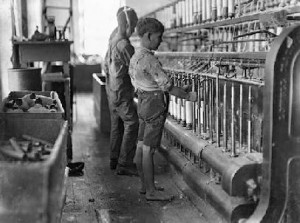The nineteenth century saw an explosion of industrialization which spurred innovation, but had grave consequences for the growing working class. Child labor was rampant and the conditions in factories were detestable. Richard Oastler, a proponent for the ten hour working day, bemoaned the new economic system under which parents had to send their children off to the factory in order to make ends meet. He claimed that children laboring in factories destroyed familial connection as their parents became nothing but a wakeup call and someone to put them to bed after a thirteen hour or longer work day. Child laborers were also subjected to tortures such as vicious whipping for the smallest mistakes. ((Yorkshire Slavery, Richard Oastler)) A medical examiner’s survey of a particular group of textile workers highlighted their deformed appearance and ill health. Their complexions were pale and sickly and they had a notably short stature resulting from long hours standing on the factory floor or stooping to work machines. The tendency for laborers to remain in a sedentary position during their tasks supposedly stunted the development of children, making them shorter with curved spines. ((The Physical Deterioration of Textile Workers))
Abhorrent working conditions with little to no regulation pushed many workers to the brink of uprising. H. Heine’s poem “The Silesian Weavers,” about a protest by workers of the same name, claimed the weavers were producing Germany’s funeral shroud as they “[sat] at the spinning wheel, snarling cheerless.” ((The Silesian Weavers, H. Heine)) The Weavers’ protest pushed the King of Prussia to give his people a constitution. To many, such an uprising would be seen as a success, but the economist Karl Marx would consider it an incomplete revolution because the workers remained in their debased position in the aftermath. Marx viewed increased regulation and improved working conditions as nothing more than appeasement which made workers complacent slaves to the capitalist system. The enlightened idea of progress was dominant in many thinkers’ rationales, but what progress looked like often differed. In regard to Marx’s view of progress and the necessary worker revolution, do regulatory policies such as shortened work days and minimum wage significantly improve workers’ lives, or simply keep them in a perpetual state of oppression?
Picture from: https://geopolicraticus.files.wordpress.com/2010/04/child-labor.jpg

